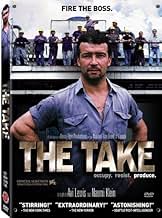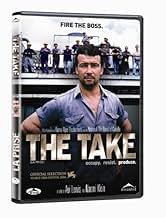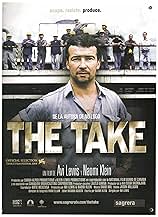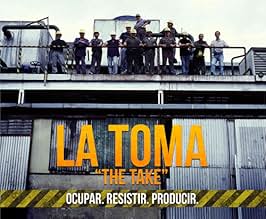IMDb RATING
7.6/10
1.2K
YOUR RATING
In the wake of Argentina's economics collapse of 2001, factory workers break into abandoned factories and restart production. Could these pioneers of cooperative ownership be a model for reb... Read allIn the wake of Argentina's economics collapse of 2001, factory workers break into abandoned factories and restart production. Could these pioneers of cooperative ownership be a model for rebuilding Argentina's economy?In the wake of Argentina's economics collapse of 2001, factory workers break into abandoned factories and restart production. Could these pioneers of cooperative ownership be a model for rebuilding Argentina's economy?
- Awards
- 1 win & 5 nominations total
Bill Clinton
- Self
- (archive footage)
Gustavo Cordera
- Self (singer)
- (as Bersuit)
Carlos Saúl Menem
- Self
- (as Carlos Menem)
Juan Domingo Perón
- Self
- (archive footage)
- Director
- Writer
- All cast & crew
- Production, box office & more at IMDbPro
Featured reviews
The Take is perhaps one of the most inspirational films I had ever seen. It provides an example to all of us - in terms of what we could accomplish if only we came together, if only we joined hands like those grandmothers in the streets of Argentina, like those workers who took production and decision making into their own hands. True democracy has to start from the bottom up, it has to start in the family, in the school, in the workplace, in the neighborhood and expand outward from there. Only when decisions in *all of these* social settings are made democratically, based on majority vote, only then, can our society begin to call itself democratic. This is currently not the case in the United States. It is not the case in the US family, nor in US schools, and no where is it more untrue than in the US workplace. Currently in the United States practically all decisions are made by those in power, by those with the money, and enforced on those underneath. When somebody gets fired from a workplace, do all the workers get together and vote on whether the person should be kept or fired? Do the children in the US schools have any democratic power to decide how things are done and organized? Do wives have equal power with their husbands in the American family? So how can a society that is so undemocratic claim to be a model of democracy for others? It is unfortunate that in the US democratic participation is limited to electing individuals to power, and is never directly related to policy issues. Our society would be much more democratic if we voted like specifically on the questions at hand both at the national and at the local level: REFERENDUM: Should US troops remain in Iraq? Should gay marriage be legal? Etc. All the questions that are most important to us, why don't we just vote specifically on them? The movie about Argentine factory workers has a message about democracy: "We vote often, that way we get used to loosing". If we were to vote more often, and to vote specifically on the issues that are important to us, then we would have a true participatory democratic society. So the Take, in my opinion is *a very important* film, and is something that all workers around the world and all people should learn from.
Some other comments I have about the Take are as follows. -By taking over Argentine factories, the workers are benefiting not only themselves and their families, but also their communities and Argentina as a whole, by contributing to economic recovery. I think this is a very important point. - It is unclear to me how the workers were able to make the factories profitable again, despite the economic crush. Because generally, when an economic collapse takes place and people lose jobs and savings, the demand for new goods declines, and that is probably why the factory owners were forced to shut down their factories in the first place. So how are the workers able to sell off their final products after taking over production? Is there some kind of barter system in place? Are the workers getting their inputs domestically instead of by importing them? I wish the film explained this. -The issue of private property is raised in the film. Should people really have the right to own stuff if they are not making good use of it? I mean, like if you are a kid with a toy, and you aren't playing with your toy, and the kids next to you want to borrow your toys because they actually want to play together, shouldn't you just give it to them, since you are not using it anyway? I mean why is the law on the side of those who want to keep their toys to themselves and do nothing with it?
Some other comments I have about the Take are as follows. -By taking over Argentine factories, the workers are benefiting not only themselves and their families, but also their communities and Argentina as a whole, by contributing to economic recovery. I think this is a very important point. - It is unclear to me how the workers were able to make the factories profitable again, despite the economic crush. Because generally, when an economic collapse takes place and people lose jobs and savings, the demand for new goods declines, and that is probably why the factory owners were forced to shut down their factories in the first place. So how are the workers able to sell off their final products after taking over production? Is there some kind of barter system in place? Are the workers getting their inputs domestically instead of by importing them? I wish the film explained this. -The issue of private property is raised in the film. Should people really have the right to own stuff if they are not making good use of it? I mean, like if you are a kid with a toy, and you aren't playing with your toy, and the kids next to you want to borrow your toys because they actually want to play together, shouldn't you just give it to them, since you are not using it anyway? I mean why is the law on the side of those who want to keep their toys to themselves and do nothing with it?
This movie helps progressive people address one of the main criticisms of the right and capitalists: what would you do differently if capitalism and globalization is so bad?
Argentina was a country where public utilities had been sold off and money fled the country. Factories were left empty, owing millions of dollars in taxes to various levels of government. The workers thought: we don't have jobs, so we can't buy things for our families. There are no jobs, because people aren't buying things for their families. So they broke the cycle, and with government approval (eventually) occupied the factories and just started producing items for themselves and their neighbors. The co-operative/collectivist movement in Argentina flourished.
The movie shows it was far from easy, and there are many hurdles left to overcome for this country and its people. But it's a hopeful message that if you buy locally, use locally produced services and products produced "locally", you create a viable economic cycle that enriches everybody. You may not have $40 microwaves produced someplace else on the other side of the world, but instead you get a quality product produced by your neighbour, that doesn't require the expense and waste of trans-global shipment. Then, the makers of cheap microwaves will be forced to pay their workers more in order to create a local/national market for their products, rather than using slave labour and shipping the products overseas to the "first world".
Okay, I'm off my soap box. Well done movie with real emotion and appeal.
Argentina was a country where public utilities had been sold off and money fled the country. Factories were left empty, owing millions of dollars in taxes to various levels of government. The workers thought: we don't have jobs, so we can't buy things for our families. There are no jobs, because people aren't buying things for their families. So they broke the cycle, and with government approval (eventually) occupied the factories and just started producing items for themselves and their neighbors. The co-operative/collectivist movement in Argentina flourished.
The movie shows it was far from easy, and there are many hurdles left to overcome for this country and its people. But it's a hopeful message that if you buy locally, use locally produced services and products produced "locally", you create a viable economic cycle that enriches everybody. You may not have $40 microwaves produced someplace else on the other side of the world, but instead you get a quality product produced by your neighbour, that doesn't require the expense and waste of trans-global shipment. Then, the makers of cheap microwaves will be forced to pay their workers more in order to create a local/national market for their products, rather than using slave labour and shipping the products overseas to the "first world".
Okay, I'm off my soap box. Well done movie with real emotion and appeal.
10protek22
The Take is one of the most informative economic and political documentaries currently available. The issues Ms. Klein and her colleagues chronicle, are of extreme importance for anyone seeking to gain a factual understanding of today's most pressing economic and political issues. Argentina had been a poster child for the globalization and neoliberal economic policies promoted by the U.S., the World Bank, and the IMF. While these policies are still being widely hailed by the mainstream media as the wave of the future, their truly destructive nature is actually understood by very few. This film allows the viewer to witness the catastrophic economic and political challenges that brought Argentina to it's knees, and the inspired solution implemented by Argentinian workers, as they rallied from the depths of economic and political despair, to redeem themselves from the clutches of corrupt politicians, and global financiers.
namely that there ARE options available to us all.
8/10 for the message of hope, commiseration for our working/unemployed Argentine brothers and sisters.
6/10 for the quality of the film.
there is so much unhappiness among the people of the world that ARE working, let alone those suffering war, poverty/sickness. Billions of workers' tax dollars bailing out banks and corporations, as decisions by the politicians of canada and the u.s.?!? You need to wake up if you do not realize the intent behind such policies. Why do so many people continue to accept idiotic and heartless "bosses" in the workplace? Their positions of power are supported by fear, and violence. We NEED movies like this at the very least to show us all the glimmer of light at the end of OUR long, dark tunnel..
the direct democracy worked towards by the people filmed here, is the democracy i believe in. for me the most important lesson here is that the workers succeeded with the support of their Community.
great things are possible when we work together.
Occupy.Resist.Produce!
Horizontalidad!!
8/10 for the message of hope, commiseration for our working/unemployed Argentine brothers and sisters.
6/10 for the quality of the film.
there is so much unhappiness among the people of the world that ARE working, let alone those suffering war, poverty/sickness. Billions of workers' tax dollars bailing out banks and corporations, as decisions by the politicians of canada and the u.s.?!? You need to wake up if you do not realize the intent behind such policies. Why do so many people continue to accept idiotic and heartless "bosses" in the workplace? Their positions of power are supported by fear, and violence. We NEED movies like this at the very least to show us all the glimmer of light at the end of OUR long, dark tunnel..
the direct democracy worked towards by the people filmed here, is the democracy i believe in. for me the most important lesson here is that the workers succeeded with the support of their Community.
great things are possible when we work together.
Occupy.Resist.Produce!
Horizontalidad!!
the worker owned factories in argentina are one of the best developments in recent history. i think the most interesting part of it is that people who are not ostensibly "political" have responded to a crisis by instituting something, spontaneously, that looks like it is within spitting distance of anarchosyndicalism. joe hill would be proud.
i saw this film as part of the touring show for the lost film festival, and it was easily the highlight of the show. I'm eagerly awaiting this to come to a local theater so i can see it again, and i'm going to try to get as many people as possible to go.
i saw this film as part of the touring show for the lost film festival, and it was easily the highlight of the show. I'm eagerly awaiting this to come to a local theater so i can see it again, and i'm going to try to get as many people as possible to go.
Details
- Release date
- Countries of origin
- Official sites
- Languages
- Also known as
- Захват
- Filming locations
- Production companies
- See more company credits at IMDbPro
Box office
- Gross US & Canada
- $30,380
- Opening weekend US & Canada
- $8,625
- Sep 26, 2004
- Gross worldwide
- $30,380
- Runtime
- 1h 27m(87 min)
- Color
Contribute to this page
Suggest an edit or add missing content


















